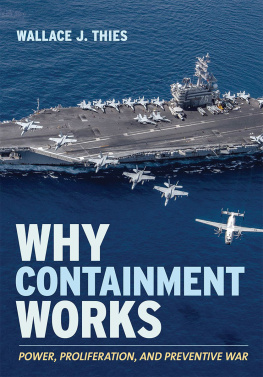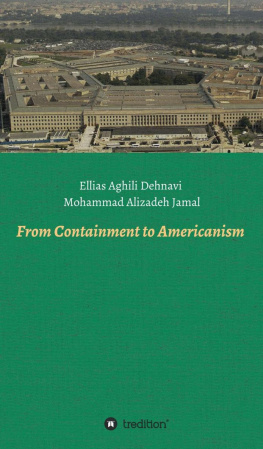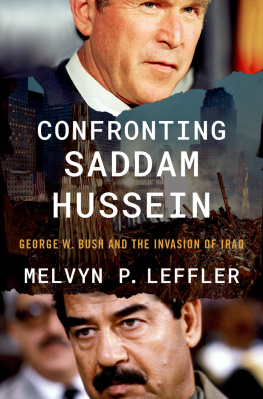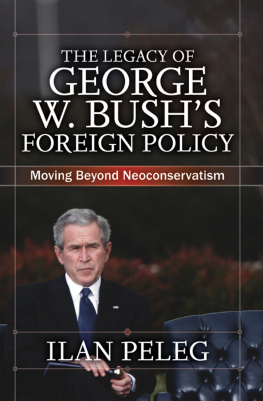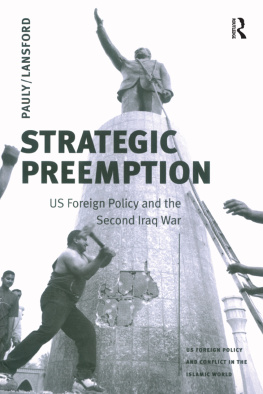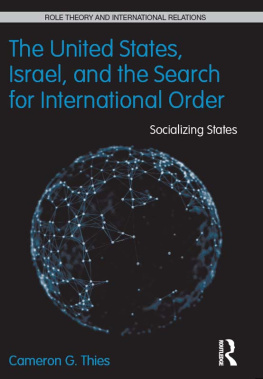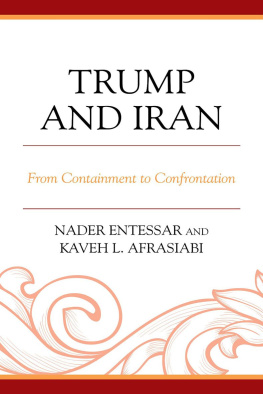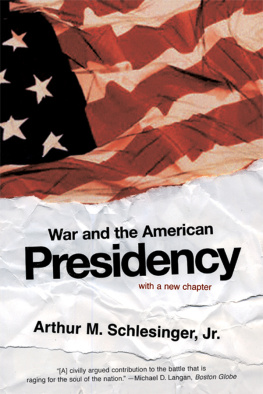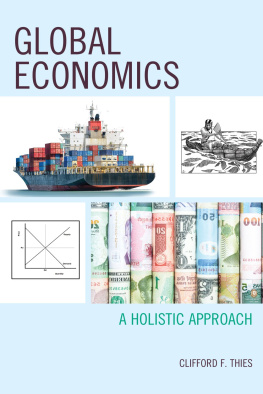Preface
The subject of this book is the strategy of containment, and why, under the proper conditions, it can serve as a viable alternative to the strategy of preventive war.
As I define it, containment is not a passive strategy, nor is it one that necessarily seeks regime change in a targeted state, although it often does. Nor is it one that seeks to prevent the target from doing anything and everything. Containment assumes that hostility exists between the container and the target, and so the strategy should be seen as a form of managed conflict that seeks to prevent the target state from overturning the local, regional, or global distribution of power. Containment aims for eventual victory over the targeted state, but it will settle for stalemate for a long, long time if necessary. Containment does not have to be practiced everywhere that two states interests bump up against each other. Instead, a state engaging in a containment strategy seeks to thwart, deny, or prevent the target state from doing only those things that the container would find dangerous and unacceptable. The criterion for judging whether a containment policy has succeeded is not whether the target state continues to put up resistance, but whether the target has actually achieved anything that the container opposes.
Seen in this light, containment is the obverse of the strategy of preventive war. Those who hold to the latter strategy see war as inevitable down the road, believe that at that point the balance of forces between the container and the target will be unfavorable for the former, and therefore that action sooner is better than action later. Unlike containment, preventive war is an impatient strategy, one that sees a need to act quickly lest the threat grow too large to handle successfully. A containment strategy believes that the restraints imposed on the targeted state, and any additional ones added in the future, are sufficient to hold it in check. A preventive war strategy, to the contrary, believes that only a swift, decisive war can remove the threat. Prompt eradication of the threat versus patiently holding it in checkthis is the crucial distinction between the two strategies.
In this book I do not claim that containment should always be the preferred strategy when a state confronts another state that poses a threat. There may well be instances when preventive war makes more sense, although I personally believe that those instances are rare. Instead, what I claim is that, when seen in historical perspective, containment has been a remarkably successful strategy for the United States. In the cases I examine containment worked in the sense that I earlier defined success.
If the goal of this book is not to demonstrate that containment is a strategy for all seasons, then what is its purpose? Simply put, to show that under the proper circumstances containment can work because it has worked. It should therefore be considered a viable alternative and taken seriously as such when the United States once again, as it inevitably will, contemplates preventive war. In short, I examine cases where containment succeeded in order to locate those factors that made it work and that can enable it to work again should the need arise.
I proceed as follows. In chapter 1, I recast the Bush Doctrine as a theory of victory, that is, a coherent strategic view that tells a state how best to transform the scarce resources available to it into useful military assets, and how to employ those assets in conflicts with other states or nonstate actors. I then compare and contrast these prescriptions derived from the Bush Doctrine with an alternative theory of victorynamely, one based on containment and deterrence. I argue that there were multiple convincing reasons for believing that the combination of containment and deterrence was workingindeed, working very wellagainst Saddam Husseins Iraq as of 2002 and 2003, and thus there was no need to invade Iraq, certainly not in 2003 and probably not for years to come.
Having introduced these two rival theories of victoryone based on the Bush Doctrine, the other on traditional notions of containment and deterrenceI then reexamine, in chapters 2 through 6, five cases of containment drawn from the Cold War and the postCold War world. The Cold War cases include containing Libya and the dual containment of Iraq and Iran. The postCold War cases include containing Iraq, invading Iraq, and containing Iran. I picked these five cases because they each offered US officials a choice between reliance on traditional notions of containment and deterrence and reliance on a more forceful approach akin to the Bush Doctrine. For each of these five cases, I explore the extent to which reliance on these rival theories of victorycontainment and deterrence versus striking firstcontributed to a successful resolution of the issues at stake. I also pose a counterfactual question: Would these cases have been resolved more quickly, at less cost, and in a manner more favorable to American interests if US officials had chosen a different mix of the coercive and deterrent tools available to them? In chapter 7, I review the relative merits of these two theories of victory based on evidence drawn from my five case studies and the Cold War too. I also assess the new knowledge made possible by comparing and contrasting these two alternative theories of victory.
Acknowledgments
An author who undertakes a project of this size and scope inevitably incurs debts to numerous individuals. Several colleagues took it upon themselves to read some or even all of the manuscript. Before the manuscript was submitted to a publisher, Mark Randol read it cover to cover and offered numerous suggestions and lots of encouragement, which was greatly appreciated. Robert Art and Roger Haydon reviewed the manuscript on behalf of the Cornell Studies in Security Affairs program. Robert and Roger went above and beyond their duties as editors and reviewers to bring the book to publication. Appreciation is an inadequate word to express my debt to them for their contributions. Robert Jervis and Stephen Walt likewise evaluated the manuscript in their role as editors of the Cornell Studies in Security Affairs.
CHAPTER 1
Preventive War and Containment
On March 18, 2003, US forces attacked Iraq with air strikes followed a few days later by a ground invasion launched from Kuwait. The purpose of both the air war and the invasion was regime change in Iraqoverthrowing the regime of the Iraqi president Saddam Hussein and replacing it with a democratic government. A democratic Iraq, the administration of George W. Bush claimed, would forgo pursuit of weapons of mass destruction (WMDs), forswear links with terrorist groups like al-Qaeda, and set an example of democratic rule that would encourage further democratization in the rest of the Middle East.
The 2003 invasion of Iraq was in many respects the culmination of a rhetorical campaign intended to redirect US foreign policy and defense policya campaign set in motion by the George W. Bush administration in the aftermath of the 9/11 terrorist attacks. Instead of containment and deterrence, the Bush Doctrine, as it came to be known, stressed preemption and even prevention. Instead of retaliating after being attacked, the Bush Doctrine called for the US to strike first. Instead of waiting to see what an opponent would do, the Bush Doctrine stressed actingindeed, acting vigorouslyto prevent potential terrorist attacks before they could be carried out.

